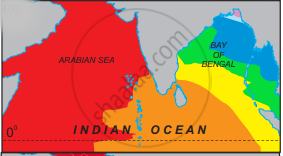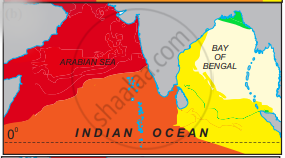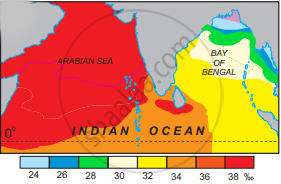Advertisements
Advertisements
Question
Given below are the maps depicting the salinity distribution of the northern Indian Ocean. Study the maps.
- NE monsoon,
- pre-SW monsoon
- SW monsoon
given in figure carefully and answer the following questions.
- Why does the Arabian Sea record higher salinity than the Bay of Bengal?
- What is the minimum salinity in the Bay of Bengal? In which seasons do we find it?
- Account for the high salinity in the Arabian Sea throughout the year?



Short Note
Solution
- (i) The Arabian Sea experiences a higher rate of evaporation due to low air humidity, high temperature, and lower rainfall.
(ii) The number of rivers adding fresh water to the Arabian Sea are fewer in number as compared to the number of long rivers that add fresh water into the Bay of Bengal.
(iii) Due to huge discharge from the Ganga system and also from long rivers of peninsular India like Krishna, Mahanadi, Cauvery (Kaveri), etc., salinity is low.
This leads to higher salinity in the Arabian Sea as compared to the salinity of the Bay of Bengal. - The minimum salinity in the Bay of Bengal is 30 PSU (Practical Salinity Unit). This occurs in the late autumn and early winter months (November to January) when the East India Coastal Current flows southwards carrying low salinity water.
- The Arabian Sea experiences a higher rate of evaporation due to low air humidity, high temperature, and lower rainfall.
- The number of rivers adding fresh water to the Arabian Sea is fewer in number as compared to the number of long rivers that add fresh water into the Bay of Bengal.
- The rivers joining the Arabian Sea are short and swift so their volume of water is less. As a result, the supply of freshwater is less. This leads to higher salinity in the Arabian Sea as compared to the salinity of the Bay of Bengal.
shaalaa.com
Indian Ocean Salinity
Is there an error in this question or solution?
